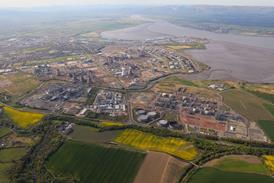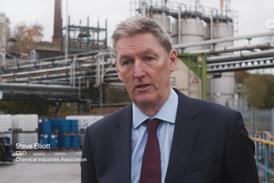- Home
- About
Economic Reports
The CIA gathers industry insights through a quarterly business survey to advocate for our members’ interests with policy makers, regulators and other stakeholders.
Read more
- Our focus
CIA Sustainable Health Metrics Tool
Use our Sustainable Health metrics to drive continuous improvement and foster a sustainable, healthy workplace.
Read more
- The Chemical Industry
The Chemical Industry
The chemical and pharmaceutical industry is fundamental to modern society. With an immense variety of products, from vital medicines and foods, the construction of buildings, to transport and leisure, the industry truly does have an impact on virtually every aspect of our daily lives.
Read more
- Events
- News
- Become a member

Tackling Climate Change Through Chemistry
The chemical industry is at the forefront of the net zero revolution

Formula for success
The industry of industries: Chemical products make up over 95% of all manufactured goods - vital for food and medicines or materials for mobile phones and electric vehicle batteries to name a few.
The problem solver: Chemical sciences are key to solving the world’s current challenges.
The critical enabler: We are a staunch promoter of innovative solutions and ambitious targets to ensure net zero for all sectors.
The economic contributor: Critical to the Government’s levelling-up agenda, we have a highly skilled and wellrewarded workforce, in many pivotal locations across the country. We provide over 500k jobs, adding more than £18bn of value to the UK economy.
Delivering the solutions
What we need from government
Design a long-term, joined-up net zero policy framework
Carbon pricing is effective when it creates certainty for investors that new technologies will yield a return. This requires clear, consistent, long-term policies, a predictable price signal, support for innovative clean technologies and most importantly, a level playing field with competitors internationally.
Empower energy and resource efficiency
Continuously improving the efficient use of energy and materials is a critical driver in the creation of a net zero and circular economy, with investments helping support the transition.
Protect industry through its transition
Effective, long-term and predictable carbon leakage protection will be fundamental, as UK businesses adopt manufacturing methods that come with a ‘green premium’. Essential elements include minimising non-wholesale energy costs and a level-playing field on carbon pricing.
Build a world-leading net zero energy system
Access to secure, reliable and competitively priced sources of zero carbon energy to allow UK manufacturers to switch to clean fuels, the roll-out of clean electricity coupled with investible hydrogen and carbon capture and storage business mode will be key.
Lay foundations for new circular economy
Reliable access to sustainable raw materials that will form the basis of a new circular economy, are essential to enable the sector to develop the advanced materials needed for a climate friendly world.
Simplify the policy mix
There has been a proliferation of industrial energy and climate change policy over time. Multiple overlapping policies complicate and undermine investment decision-making and can create perverse incentives. Streamlining these schemes will support the UK’s decarbonisation, making it simpler for businesses to invest in the UK.
Case Studies
The Hydrogen Climate Solution - Johnson Matthey
How are we achieving net-zero?
The HyNet project is paving the way for a net zero economy by developing the UK’s first low carbon hydrogen plant. The facility will produce 80kt of hydrogen per year, and capture 600,000 tonnes of CO₂ – the equivalent of taking over 250,000 petrol or diesel powered cars off the road.
How are we improving everyday lives?
HyNet will meet the major challenge of reducing carbon dioxide missions, providing low carbon power for industry, transport and low carbon heating for our homes and businesses.
Bringing sustainable fashion to life - Dow
How are we achieving net-zero?
Dow is helping bring sustainable fashion to life without sacrificing colour or quality. Dow’s treatment process uses 90% less process chemicals and therefore a 60% lower carbon footprint. Plus, it’s helping the planet, using 50% less water and up to 40% less energy.
How are we improving everyday lives?
Dow’s sustainability mission has a focus to lessen the strain on our precious water resources.
Enabling CO2 savings for cars and aircraft - Victrex
How are we achieving net-zero?
Annual CO2 savings of over 80,000 tonnes in European cars andcnearly 100,000 tonnes in global aerospace are being saved thankscto light-weight, long-lasting and sustainable polymers. Weightsavingchelps to reduce fuel use and consequently improves CO2 emissions across major fleets of aircraft.
How are we improving everyday lives?
Looking to make more sustainable aircraft over the long-term, making it faster, lighter and cheaper.
UK’s largest Carbon Capture and Utilisation Plant - TATA
How are we achieving net-zero?
Tata Chemicals Europe has invested £20m in building of UK’s largest Carbon Capture and Utilisation Plant in Northwich, reducing its emissions by 11% and enabling net zero manufacturing of one of its key products, sodium bicarbonate.
How are we improving everyday lives?
Exported to over 60 countries globally, sodium bicarbonate is used in many everyday products in from pharmaceuticals, cooking, to fire extinguishers, personal care and many others.
More facts
- The chemical industry is committed to delivering more sustainable solutions for a cleaner, greener society.
- We are an essential enabler and driver of net zero for all sectors, especially automotive, transportation and pharmaceuticals.
- Not only are chemicals essential components to energy-saving products but cutting emissions and transforming chemical production have a huge impact globally and can transform the world around us.
- We have an important role to play in moving to low-carbon economies – providing coatings for solar panels, lightweight plastics to reduce vehicles’ energy consumption and insulating materials for buildings.
- It is through our industry’s innovation and technology that will allow other companies and sectors to decarbonise, deliver the UK’s net zero ambitions and ultimately, combat climate change.









